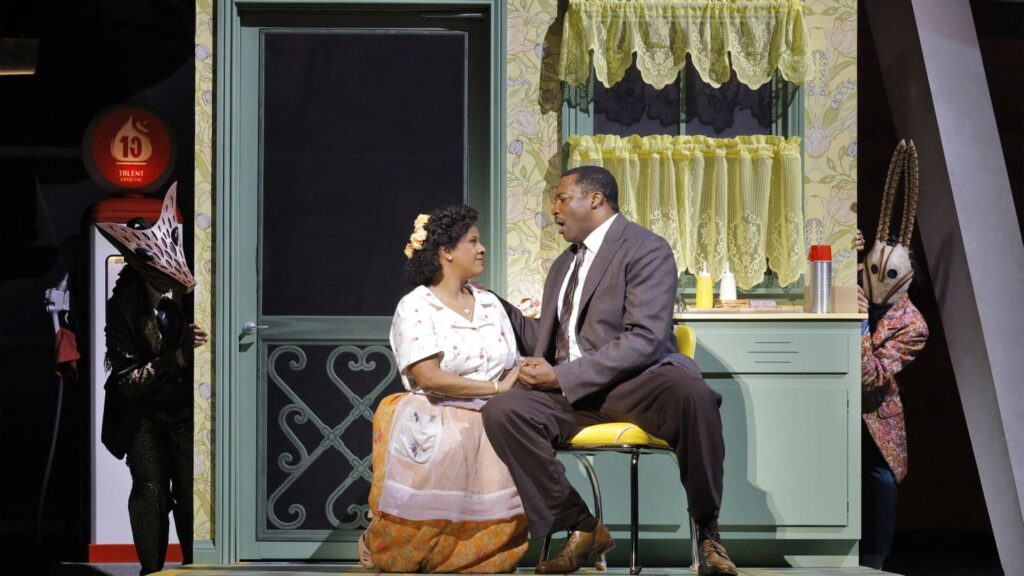James Conlon, LA Opera’s music director, has long championed a group of composers, silenced by the rise of the Third Reich in Germany. To shine a light on these unjustly forgotten composers and their work, he inaugurated a Rediscovered Voices series which offered LA audiences the opportunity to admire these little-seen works over several seasons.
For 2024 Conlon has expanded the series beyond its German inspiration, reviving one of the most memorable of those productions, Victor Zemlinksy’s DER ZWERG (THE DWARF), and pairing it with an opera by William Grant Still, an American composer who, while achieving some fame in his life, found many doors closed to him by a racist musical hierarchy.
Still’s HIGHWAY 1, USA had a long gestation period, as the composer started work on it in the Late 40’s, but it didn’t receive a production until the Early 60’s, by which time the opera would have probably seemed hopelessly old-fashioned with its Inge-like realism and its traditional post Romantic score. Today’s audience is better prepared to admire Still’s often ravishing music which seems oddly at arm’s length from the tawdry tale he is musicalizing.
Still’s wife, Verna Arvey, wrote HIGHWAY 1’s libretto which centers on Bob (Norman Garrett) and Mary (Nicole Heaston), a couple running a gas station off the titular highway. Bob’s no-good younger brother, Nate (Chaz’men Williams-Ali), is living with them because Bob promised his dying mother he would take care of him. Mary is right to feel uncomfortable around her brother-in-law as Nate attempts to seduce her, then rape her, and finally stabs her as she tries to fight him off. All while still in his pajamas. Bob is ready to take the rap for Nate, but the townspeople all recognize that Bob could never hurt Mary, and Nate is taken to prison.
Director Kenza Schaal makes a bold choice in adding the characters of Brer Rabbit and Brer Fox to the top of the production. Unfortunately, they soon are relegated to moving scenery. Schaal does her best to keep the action motivated. But, in the second half of the opera, she is defeated by the libretto which piles the melodramatic moments on so quickly that realism flies out the window.
Heaston and Garrett bring sensitive acting and generous vocals to their roles. Williams-Ali seems a little underpowered vocally, but he readily wears his selfishness on his sleeve. Deborah Nansteel makes a powerful impression both vocally and dramatically in the role Aunt Lou.
The curtain is left up at the end of the opera and, if you remain at your seat for intermission, you have the rare opportunity to watch the stagehands change the set over from the 50’s gas station to a 17th Century Spanish palace.
Victor Zemlinsky’s, THE DWARF, makes a welcome return to the Chandler in the same production that thrilled us in 2008, featuring the same singer playing the Dwarf. Based on a story by Oscar Wilde which, in turn, was suggested by a Velazquez painting, the opera examines the familiar Wildean theme of beauty vs. ugliness. The subject apparently resonated for Zemlinsky in a personal sense as he was famously unattractive.
The Dwarf (Rodrick Dixon) has been given to the Spanish Infanta (Erica Petrocelli) as a decidedly odd curiosity on her birthday. Realizing that he has lived a protected existence, sheltered from the reality of his looks by never seeing his reflection, the Infanta toys with the smitten Dwarf and ensures that a mirror is available to him. He looks into it and discovers the devastating truth of his ugliness. The Infanta callously tells the Dwarf that she could never love an animal like him. She goes off to dance at her birthday ball, leaving the Dwarf to die in despair.
Zemlinsky has set this story to passionately romantic music set in a fascinatingly exotic palette. His obvious inspiration is Strauss’ SALOME (from another Wilde source) and the orchestral writing includes much of the shimmering transparency and percussive propulsion of the Strauss score. THE DWARF (first performed in 1922) comes from Weimar Republic era when the Nazis were still a minor political party. But there is no denying that their treatment of Zemlinsky broke his spirit and relegated his career to a historical footnote.
Petrocelli brought generous sound, musical precision, and an appropriately heartless manner to the Infanta, while Dixon’s Dwarf remains beautifully sung but has grown in in tragic power. Emily Magee was beautifully sympathetic as Ghita, the Infanta’s maid, who understands her mistresses’ heartlessness and reaches out to the Dwarf with comfort. The female chorus reveled in the gorgeous music Zemlinsky provided, and a small coterie of male dancers brought some levity as they capered nimbly.
Darko Tresnjak’s direction was clear and unfussy while Ralph Funicello’s sets and Linda Cho’s costumes were eye-popping and richly characterized. From the pit, Conlon’s love for these operas was tangible, and we must be grateful for his devotion in bringing these pieces a new artistic life.
Dorothy Chandler Pavilion February 24 – March 17, 2024 LAOpera.org

